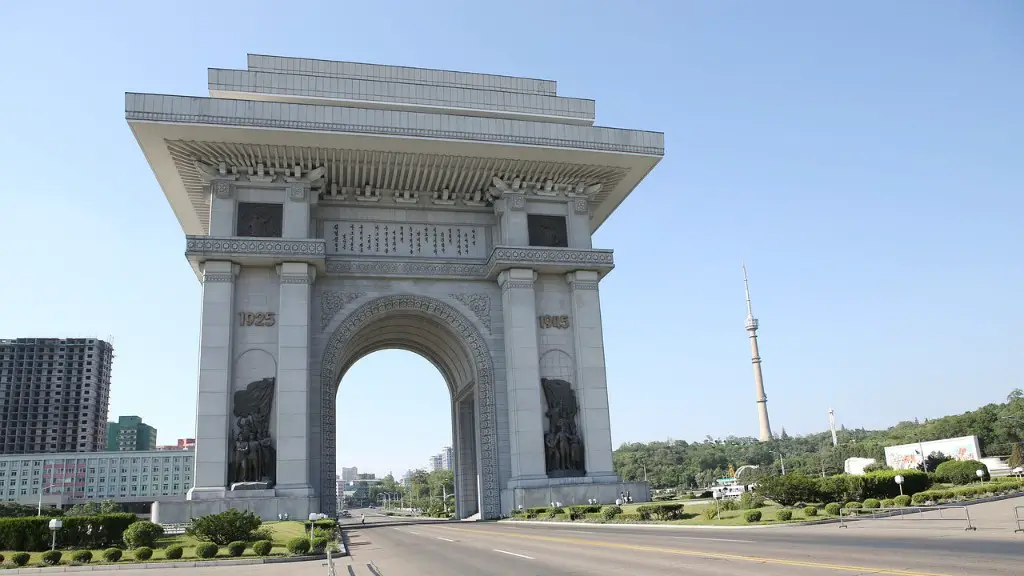Background on the Korean War
The Korean War, also known as the Forgotten War, was a Cold War conflict between 1950 and 1953 in the Korean peninsula. It was a war between North Korea, backed by China and the Soviet Union, and South Korea, which was backed by the United Nations, with primarily U.S. forces. The war began when North Korea launched a surprise attack on South Korea on June 25, 1950. It quickly escalated into a full-scale war, with North Korean forces forced out of the country and advancing as far south as the Pusan Perimeter. In late 1950, U.N. forces under General Douglas MacArthur made a daring landing at Incheon, south of the 38th parallel, and reversed the tide of the war. Following this, U.S. forces under the command of General Matthew Ridgway advanced towards the 38th parallel and eventually recaptured Seoul in March 1951. The war eventually ended in a stalemate, with an armistice signed in 1953.
What Was North Korea Fighting For In The Korean War?
North Korea’s motivations for entering the Korean War were rooted in the ideologies of communism, which were propagated by both the Chinese and Soviet Union governments. North Korea’s strategy was to reunite the Korean peninsula under Communist control, which was seen as a threat to global stability and to the security of the United States, which had military forces stationed in South Korea. North Korea also sought to create a unified Korea that would be free from outside interference, and it saw its invasion of South Korea as a way to reach this goal. North Korea believed that with its allies’ support, it would be able to overpower the South and reunite the peninsula.
North Korea was also driven by the need to protect its economy and its citizens from what it saw as an oppressive capitalist system in South Korea. North Korea argued that the South was dominated by U.S. economic interests and had neglected the economic needs of its people. This motivated North Korea to attempt to reunite the peninsula and create an economic system that was more equitable and more beneficial to the North Korean people.
North Korea also had a powerful and influential lobby within the Chinese and Soviet governments. This lobby sought to use North Korea as a pawn in the Cold War between the two superpowers, and pushed for North Korea’s involvement in the war. North Korea was an easy target for the Chinese and Soviets, as it was a relatively weak country with limited defensive capability. These countries saw North Korea’s involvement in the war as a way to flex their military muscles and gain a strong foothold in the region.
North Korea’s Propaganda During The War
To rally North Koreans behind the war effort, North Korea’s government employed a wide variety of propaganda tactics throughout the war. North Korean media outlets portrayed the war in a heroic light and framed the conflict as a battle against oppressive Western forces. The North Korean government also sought to instill fear in the population by disseminating stories of American atrocities and crimes committed against the North Korean people. This propaganda was highly successful in rallying the North Korean people behind the war effort, as it made them feel that they were fighting against powerful enemies to protect their country and its ideals.
North Koreans also received regular doses of juche – the national ideology of North Korea. Juche was a form of political thought that emphasized North Korean independence and sovereignty and strove to create a self-reliant economy. This ideology provided a powerful source of motivation and inspiration for North Korean soldiers and citizens, who believed that they were fighting to protect their nation and its ideals of self-sufficiency and freedom.
North Korean Leaders During The War
Kim Il-sung, the leader of North Korea at the time of the war, was the key figure behind the war effort. He was a staunch communist, who saw the Korean War as a chance to bring the entire Korean peninsula under his control. He was also a powerful orator and was highly successful in rallying the North Korean people behind the war effort. In addition to Kim Il-sung, a number of prominent military leaders, such as Choi Sung-Do, General Chae Doo-hwan, and General Pak Il-yong, played a vital role in leading North Korea during the war. These men were instrumental in the success of North Korea’s military campaigns during the war and their leadership was critical to victory.
North Korea’s Final Defeat
Despite North Korea’s initial successes in the war, it was eventually defeated by the U.N. forces. North Korea was eventually pushed back to the 38th parallel, and an armistice was signed in 1953. Despite the armistice, a peace treaty was never signed and the two Koreas remain divided to this day. The war was a major defeat for North Korea and its allies, as it had hoped to reunite the peninsula and create an independent Communist state.
Although North Korea failed to achieve its goal of reunification, the war had a major impact on the country. The war left South Korea with a stronger economy and U.S. security guarantees, while North Korea emerged as an isolated and impoverished state. North Korea’s economy suffered heavily in the aftermath of the war, and the country only began to recover in the 1990s. Even today, North Korea is heavily reliant on its allies to provide the country with economic and military aid.
America’s Response To The War
The U.S. was a major participant in the Korean War, with over a million American soldiers fighting in the conflict. The U.S. fought mainly to contain the spread of Communism and to protect its strategic interests in the region. It also provided vital support to South Korea, which allowed the country to withstand the North Korean onslaught and develop its economy. Although the war ended in a stalemate, the U.S. was able to contain the spread of Communism and keep South Korea firmly in the Western sphere of influence.
In addition to providing military aid, the U.S. also provided economic aid to South Korea. After the war, the U.S. provided billions of dollars in economic assistance to help rebuild the war-ravaged country and to establish a strong industrial base. This assistance was critical for South Korea’s economic growth and transformation into a vibrant democracy.
Deeper Analysis
The Korean War was one of the bloodiest conflicts of the twentieth century, and it had a major impact on the Korean Peninsula. North Korea’s aim in the war was to reunify Korea under Communist rule, but this goal was never achieved. Despite the ultimate failure of North Korean forces to achieve their goal, the war had a major effect on the power dynamics in the region. North Korea’s defeat further entrenched the country’s isolation and increased the reliance on its allies, while South Korea’s victory in the war allowed it to develop into a vibrant democracy and a major economic powerhouse. The Korean War was a major event in the history of the region and its impact is still felt today.
The Causes Of The War
The Korean War was a complex conflict, which was driven by a variety of political, economic, and ideological factors. The primary cause of the war was the ideological divide between North and South Korea, with North Korea seeking to reunite the peninsula under Communist rule and South Korea seeking to preserve its democratic ideals and maintain its ties to the U.S. and its allies. However, the conflict was also viewed as part of the more general Cold War struggle between the U.S. and the Soviet Union, and influenced by the Chinese government’s desire to spread its influence throughout the region. The war also had an economic component, as North Korea sought to create an economy that was more equitable and beneficial to its people. The different motivations of the involved parties drove the intensity of the conflict and ultimately resulted in the war.
The War’s Impact On The Korean Peninsula
The war had a major impact on both North and South Korea. In North Korea, the war led to economic devastation and increased reliance on its allies for support, while in South Korea it allowed for economic growth and the emergence of a vibrant democratic society. The war also resulted in a proliferation of anti-American sentiment in North Korea, which persists to this day. The war also resulted in an escalation in military tensions on the peninsula, as both North and South Korea developed large standing armies and increased their military spending. The dark legacy of the war still haunts the Korean peninsula, and the conflict serves as a reminder of the importance of diplomacy and negotiation in resolving conflict.
The Korean War’s Legacy
The Korean War was a major conflict in the history of the region and its impact is still felt today. It was a complex conflict, which was driven by a variety of political, economic, and ideological factors and had a major impact on the countries involved. The war also highlighted the importance of diplomacy and negotiation in resolving conflict, and serves as a reminder of the cost of war and the need for peaceful resolution of disputes.
The war also had a major impact on the global balance of power. The war demonstrated the power of the United Nations and the importance of collective security, and it also highlighted the growing importance of the U.S. in global affairs. The war also highlighted the strategic importance of the Korean peninsula and its proximity to U.S. allies such as Japan and China. The Korean War was a major conflict in the region and its legacy continues to be felt today.



